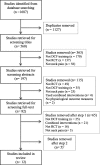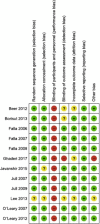Effects of deep cervical flexor training on impaired physiological functions associated with chronic neck pain: a systematic review
- PMID: 30486819
- PMCID: PMC6263552
- DOI: 10.1186/s12891-018-2324-z
Effects of deep cervical flexor training on impaired physiological functions associated with chronic neck pain: a systematic review
Abstract
Background: Neck pain is a major health issue with high rates of recurrence. It presents with a variety of altered sensorimotor functions. Exercise is a cornerstone of rehabilitation and many training methods are used. Exercise is evaluated in most randomized controlled trials on its pain relieving effects. No review has assessed the effect of exercise on the altered physiological functions or determined if there are differential effects of particular training methods. This review investigated the effects of deep cervical flexor (DCF) training, a training method commonly used for patients with neck pain, and compared it to other training methods or no training on outcomes of cervical neuromuscular function, muscle size, kinematics and kinetics.
Methods: Web of Science, Scopus, CINAHL, PubMed were searched from inception until January 2018. Twelve randomized controlled trials were included that compared DCF training as sole intervention to other training or no interventions in persons with neck pain. The Cochrane Risk of Bias tool was used to assess the method quality. All outcome measures were analysed descriptively and meta-analyses were performed for measures evaluated in three or more studies.
Results: DCF training was compared to cervical endurance, strength, proprioception and mobility training, muscle stretching, and no intervention control groups. Physiological outcome measures included neuromuscular co-ordination (craniocervical flexion test), functional tasks, muscle fatigability, muscle size, kinematics (joint position sense, posture and range of motion) and kinetics (strength, endurance and contraction accuracy). Strong evidence was found for effectiveness of DCF training on neuromuscular coordination, but it had no or small effects on strength and endurance at higher loads. DCF training improved head and cervical posture, while evidence was limited or contradictory for other measures.
Conclusions: DCF training can successfully address impaired neuromuscular coordination, but not cervical flexor strength and endurance at higher contraction intensities. A multimodal training regime is proposed when the aim is to specifically address various impaired physiological functions associated with neck pain.
Keywords: Deep cervical flexor training; Neck pain; Physiological outcome measures; Strength training; Systematic review.
Conflict of interest statement
Ethics approval and consent to participate
Not applicable.
Consent for publication
Not applicable.
Competing interests
The authors declare that they have no competing interests. Acknowledgement was made in the manuscript that one author (GJ) contributed to 8 of 12 studies included in the review.
Publisher’s Note
Springer Nature remains neutral with regard to jurisdictional claims in published maps and institutional affiliations.
Figures





References
-
- Vos T, Allen C, Arora M, Barber RM, Bhutta ZA, Brown A, et al. Global, regional, and national incidence, prevalence, and years lived with disability for 310 diseases and injuries, 1990-2015: a systematic analysis for the global burden of disease study 2015. Lancet. 2016;388:1545–1602. doi: 10.1016/S0140-6736(16)31678-6. - DOI - PMC - PubMed
Publication types
MeSH terms
LinkOut - more resources
Full Text Sources
Medical

